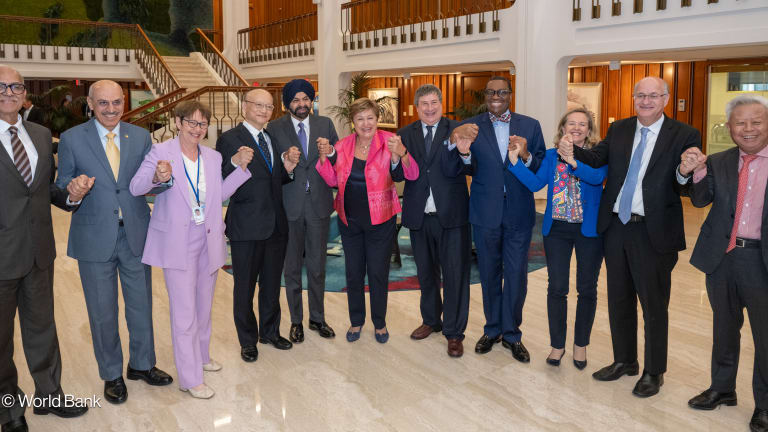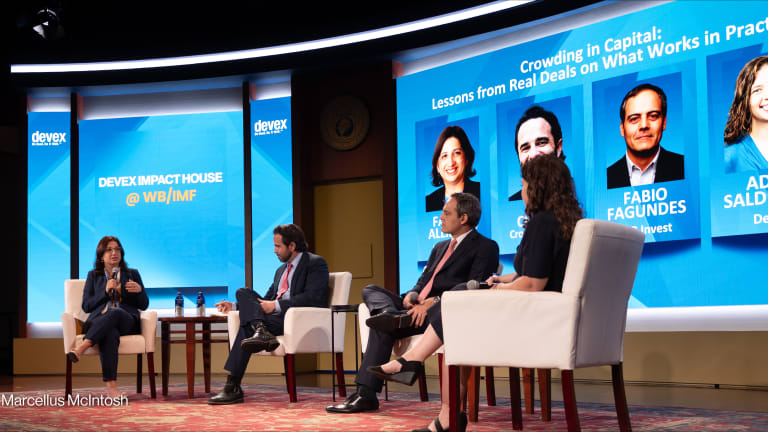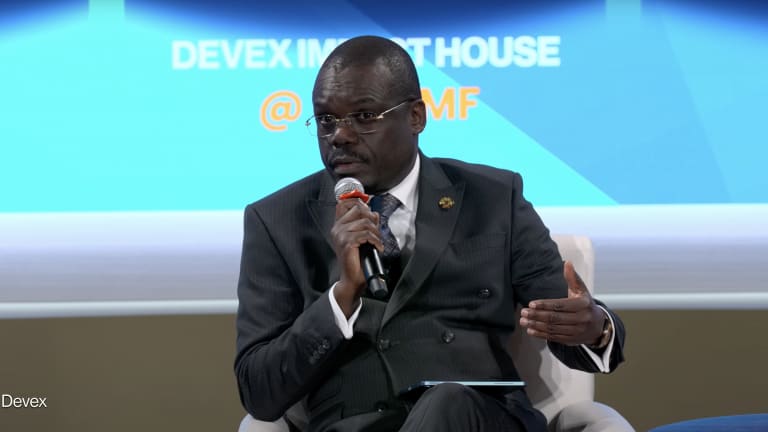How MDBs can be 'creative and innovative' in today’s environment
The managing director of Africa's Trade and Development Bank talks silver linings to the aid cuts for multilateral development banks.
With shrinking aid budgets likely translating into less concessional capital for development finance, Trade and Development Bank President and Managing Director Admassu Tadesse sees room for creativity and growth for multilateral development banks. “There’s aspects of aid embedded in development finance, but there is … a lot of market-based funding that also comes through development finance channels,” he told Devex Managing Editor Anna Gawel at Devex Impact House on the sidelines of the World Bank-IMF annual meetings. “These special windows that need special capital, very concessional capital — those sources have really dried up, as we know, and not completely dried up, but they’ve pulled back, and so it’s a challenge, but there’s opportunities to be creative and innovative,” he explained. At the Fourth International Conference on Financing for Development held in Sevilla, Spain, participants agreed that MDBs will need to multiply their impact threefold by the end of the decade. “Even though private finance is very voluminous and able to do a lot, MDBs still really have quite a bit to do, especially in the context of bilateral development assistance going down,” Tadesse noted. “There is consensus that MDBs have to scale up.” Fortunately, he added, development banks are not wholly dependent on aid. “They can actually build on their own balance sheets. They can, you know, recycle their funds. Quite a few of them are updating their strategies to sort of ensure that they’re able to work with what they have,” he said. Growth through diversification The Trade and Development Bank, or TDB, is a regional development finance institution for eastern and southern Africa that has dual headquarters in Burundi and Mauritius. It now operates in 26 countries and has seen a tenfold asset growth since 2011, Tadesse said. Diversification has been key to achieving this growth and to weathering today’s high-risk, high-interest-rate climate. “Diversification has become ever more important in this environment,” Tadesse explained, pointing to efforts to enter new markets. “We’ve diversified our ratings to be able to tap liquidity in different money markets — Japan, China. We’re looking at the Gulf. We’re looking at local markets within Africa.” Despite higher risk, he believes there remains significant investor appetite. “The cost of risk is higher and expected returns are higher in this new environment we’re in, but there’s still a lot of that available,” he said. Tadesse urged partners and development stakeholders not to fixate solely on global headwinds, but also on those going against the grain. “I think one should be careful not to read macro trends too closely, because, you know, you have to get to the ground and find the contrarian folks out there … and there are still quite a few of those.” He cited South Korea, Canada, Denmark, and the Persian Gulf states as new contributors to TDB’s balance sheet — investors largely absent a decade ago. A new playbook for debt When it comes to the continent’s mounting debt, Tadesse acknowledged the challenges of the moment: “It’s been a difficult few years.” Yet he pointed to debt swaps as a promising area. “Swaps have become more and more interesting, and there’s a lot of support these days for that,” he said, while cautioning that “guarantees are not unlimited” and success depends on “willing partners.” The old models, he added, are no longer sufficient. “Assumptions that the old mechanisms were still relevant for these times,” such as the Paris Club of mostly wealthy creditors or the Heavily Indebted Poor Countries, or HIPC, framework, “don’t make so much sense today,” he said. “You need to build consensus amongst a community of creditors.” Scaling up partnerships Looking ahead, Tadesse predicted that progress will depend on deeper collaboration. “Success would be meaningful partnerships that are scaling up,” he said. “When I look back 10 years ago, we didn’t have very strong partnerships with the World Bank Group back then. Today, we’re doing amazing things with the World Bank Group — not just one entity, its entire stable … IFC, alongside IDA and IBRD … and then we have MIGA, that’s been an important player.” For Tadesse, that evolution itself is proof that even in a constrained era, development finance can still find ways to innovate — and multiply impact.
With shrinking aid budgets likely translating into less concessional capital for development finance, Trade and Development Bank President and Managing Director Admassu Tadesse sees room for creativity and growth for multilateral development banks.
“There’s aspects of aid embedded in development finance, but there is … a lot of market-based funding that also comes through development finance channels,” he told Devex Managing Editor Anna Gawel at Devex Impact House on the sidelines of the World Bank-IMF annual meetings.
“These special windows that need special capital, very concessional capital — those sources have really dried up, as we know, and not completely dried up, but they’ve pulled back, and so it’s a challenge, but there’s opportunities to be creative and innovative,” he explained.
This story is forDevex Promembers
Unlock this story now with a 15-day free trial of Devex Pro.
With a Devex Pro subscription you'll get access to deeper analysis and exclusive insights from our reporters and analysts.
Start my free trialRequest a group subscription Printing articles to share with others is a breach of our terms and conditions and copyright policy. Please use the sharing options on the left side of the article. Devex Pro members may share up to 10 articles per month using the Pro share tool ( ).
Honesty Pern is the Opinions Editor at Devex. Before this, she managed the News Production team, overseeing newsletter, website, and editorial production. Prior to joining Devex in 2017, she worked at an urban rights NGO in Phnom Penh, and she has previously held positions at community-based NGOs in Australia and Russia. She is originally from France.








